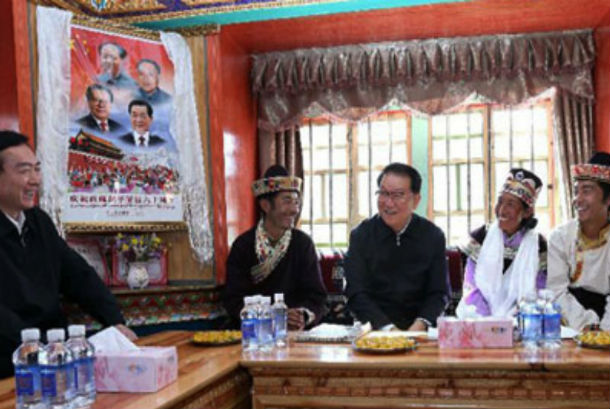 Dharamshala: - The war against separatism should be stepped up in Tibet where so called "ethnic unity, social harmony and stability is the lifeline," a top leader of the Chinese Communist Party has said. The communist leader called on Chinese authorities in Tibet to crackdown on Tibetans under the name of separatist movements.
Dharamshala: - The war against separatism should be stepped up in Tibet where so called "ethnic unity, social harmony and stability is the lifeline," a top leader of the Chinese Communist Party has said. The communist leader called on Chinese authorities in Tibet to crackdown on Tibetans under the name of separatist movements.Li Changchun, ranked fifth in the hierarchy of the communist Party, ordered for the hardline campaign during an inspection tour of Tibet capital Lhasa, where the China's propaganda chief visited the acient Jokhang Temple, the centre of Tibetan Buddhism, according to the state controlled newspaper People's Daily.
"Ethnic unity, social harmony and stability is the lifeline for Tibet," he said, adding that the ethnic unity education and the anti-separatism battle should be deepened. He was on a five-day visit to Nyitri county in Kongpo (Ch: Nyingchi) and Lhasa, the capital of Tibet, according to another state controlled news agency 'Xinhua'.
Recently, "Zhu Weiqun, who was a head of the CCP United Front, has boldly proposed abolishing all reference to nationality on the identity cards all Chinese citizens must carry, and frequently produce for inspection. This latest step towards erasing Tibetan identity as a category with legal meaning, did not come from nowhere. It has a lineage and is best understood in the context of a steady, deliberate, two-sided strategy that has been implemented over the past 20 years," said Prof Gabriel Lafitte, an Australuan Tibet expert.
Li stressed on 'ethnic unity and cultural development' in so called Tibet autonomous region (TAR) which formed in 1965, after complete occupation of Tibet by the communist red army forces led by Chairman Mao, as well as building an "ideological basis" for anti-secession and stability maintenance, he said. At Lhasa's Potala Palace, Li praised its role in safeguarding national unification and ethnic unity. The Potala Palace was the residence of Dalai Lamas until the His Holiness 14th Dalai Lama of Tibet fled to India during the 1959 Tibetan National Uprising.
At the ancient Jokhang Temple, Li gave offerings to the monastery, encouraging the monks there to be patriotic and devout and make contributions to ethnic unity and the ethnic cultural development. He also visited the headquarters of the Tibet Daily and its news website, asking the staff to "introduce a real and changing Tibet to the whole world."
"However, the same totalitarian state of China killed over 1.3 million Tibetans and destroyed more than six thousand monasteries including the ancient jokhang temple 50 years ago. I am not suprised by CCP authorities' visit to the occupied region, but Beijing is embracing itself once again showing double faces of the same old party who carry out destructive campaigns in Tibet in 1966 eradicate the so called "Four Olds" -- old customs, old habits, old culture and old thinking," said Nyima, a Tibetan analyst.
"During past 60-years, the Chinese authoriities were pretending to modernise Tibet using every possible tools to fool the world, but, If we look carefully at the past 60-year development including so called western development strategy in Tibet, most of these economy and social developments benefit to the Han Chinese to encourage them to resettle to Tibet," he added.
Tibet should seize the opportunity of the implementation of the western development strategy, and innovative efforts should be made to promote the region's leapfrog development and lasting stability, Li was quoted as saying.
According to the exile Tibetan officials, atleast 44 Buddhist monks, nuns and Tibetan lay people have set themselves on fire in Tibet accusing totalitarian regime of China pursuing repressive policies on Tibetan religion and culture.


![Tibet has a rich history as a sovereign nation until the 1950s when it was invaded by China. [Photo: File]](/images/stories/Pics-2024/March/Tibet-Nation-1940s.jpg#joomlaImage://local-images/stories/Pics-2024/March/Tibet-Nation-1940s.jpg?width=1489&height=878)















